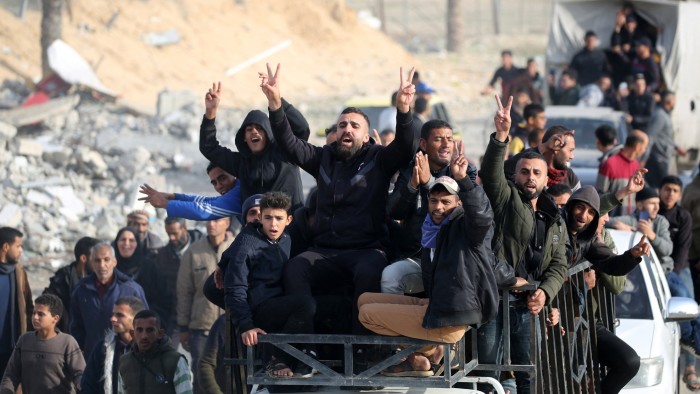A ceasefire between Israel and Hamas began on Sunday, halting 15 months of brutal war in Gaza and paving the way for the release of hostages still held by Palestinian militants in the shattered enclave.
The six-week ceasefire pauses, and potentially ends, the bloodiest chapter in the history of the decades-long Israeli-Palestinian conflict that has left Gaza in ruins, burned Israeli society and drawn the Middle East into conflict. It gives hope. On the brink of a full-scale regional war.
The cease-fire is the first step in a three-stage deal that was struck down by a U.S.-led mediator last week after months of failed attempts. ) was scheduled to take effect.
But in a sign of the deal's weakness, Israel continued airstrikes on Gaza even after Hamas delayed providing the names of the hostages scheduled for release on Sunday, delaying the start by nearly three hours.
The Israeli government announced that the first three hostages to be released in exchange for 90 Palestinian prisoners will be released after 4pm local time on Sunday. The next exchange will take place seven days later, and four more hostages will be released.
But Israeli Prime Minister Benjamin Netanyahu is under intense pressure from his far-right allies to resume fighting once the first phase of the deal ends, and the chances of its full implementation remain uncertain.
The fighting in Gaza was sparked by Hamas' shocking attack on Israel on October 7, 2023. Israeli officials said the militants killed 1,200 people in the attack and took another 250 hostages in the deadliest day for Jews since the Holocaust.
Israel responded with devastating attacks on Gaza, killing more than 46,000 people, Palestinian officials said. The move displaced most of the 2.3 million people living in the coastal enclave, reducing much of the area to rubble and precipitating a humanitarian catastrophe.
Even before the belated ceasefire took effect on Sunday, celebrations had begun to unfold in Gaza, where many displaced people were preparing to return to their ruined homes.
Mohamed Bassal, spokesman for the Gaza Civil Defense Agency, said some residents had begun returning to Jabalia, a devastated area in the northern part of the enclave, by 8:30 a.m. local time. “They were targeted by Israeli attacks, but some still arrived and our teams are there,” he said.
Among the returnees was Mohammed Abu Ismail, who previously worked for the Palestinian Authority. He went to check on his home in Jabalia camp, but found it in ruins.
“People arrive in Jabalia, are shocked, cry and return to Gaza City,” he said. “There is nothing here to sustain life. The school that sheltered the refugees was also burnt down. All features of Jabalia have been erased, and nothing remains.”
Bassal said Palestinian civil defense teams had begun recovering bodies from areas vacated by Israeli forces in Rafah and the north, and police from the days when Hamas controlled the enclave had begun to be redeployed to the city.
According to the terms of the agreement signed by mediators last week, the first phase includes a six-week ceasefire during which Hamas will seize 33 of the 98 hostages remaining in Gaza, including children, women, the sick and the elderly. It will liberate people. Approximately 1,900 Palestinian prisoners of war.
During this period, displaced Palestinians will be allowed to return to their homelands, including in northern Gaza. A partial withdrawal of Israeli forces from Gaza is also planned, and the ceasefire agreement also includes plans for a large-scale influx of humanitarian aid.
By the 16th of the first phase, Israel and Hamas are scheduled to begin detailed negotiations for a second phase agreement, during which the remaining live hostages will be released in exchange for hundreds more Palestinian prisoners and Gaza There will be a complete withdrawal of Israeli troops from the area. And the war will end forever.
The final stage will include the return of the remaining bodies of the deceased hostages and the start of rebuilding Gaza, under the supervision of Egypt, Qatar and the United Nations.
However, in a sign of Israeli far-right hostility to the deal, just before it took effect, far-right National Security Minister Itamar Ben Gvir withdrew his Jewish Power Party from the government in protest, reducing Prime Minister Benjamin Netanyahu's majority in Israel. Ta. The 120-seat parliament is reduced to just two seats.
Ben Gvir's ultranationalist ally, Finance Minister Bezalel Smotrich, also threatened to pull his Religious Zionist party from the government if the war is not restarted after the first phase of the deal. This would deprive Prime Minister Netanyahu of his parliamentary majority.
Smotrich doubled down on his threat on Sunday, saying he would overthrow the government unless Israel resumes fighting by “occupying and governing the entire Gaza Strip.”
Prime Minister Benjamin Netanyahu has previously denied that Israel is seeking to take control of Gaza after the war. But he said Saturday that the United States supports Israel's right to resume fighting if talks on details of a second phase fail.
He also insisted that Israeli forces maintain “full control” of the so-called Philadelphia Corridor, which separates Gaza and Egypt. “If we have to return to the fight, we will return in a new way and we will return with great force,” Netanyahu said.

